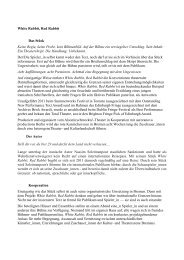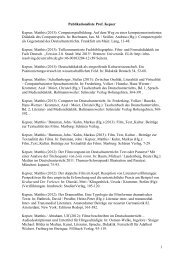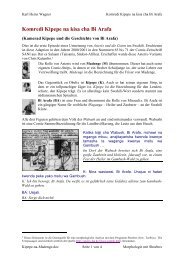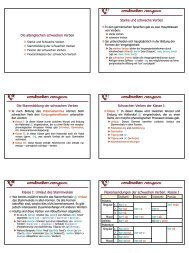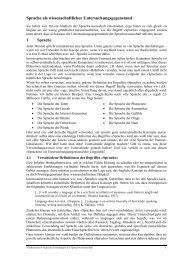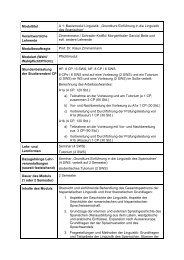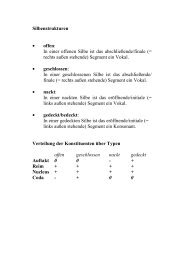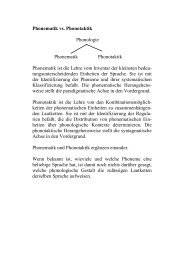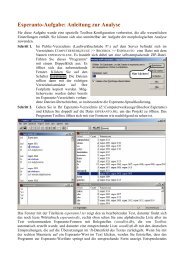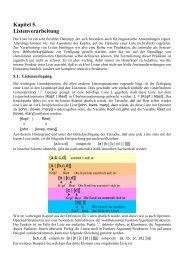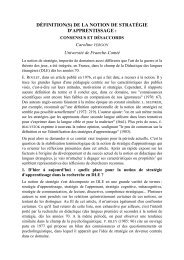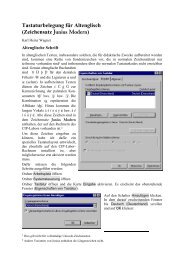Relativism and Universalism in Linguistics - Fachbereich 10 ...
Relativism and Universalism in Linguistics - Fachbereich 10 ...
Relativism and Universalism in Linguistics - Fachbereich 10 ...
You also want an ePaper? Increase the reach of your titles
YUMPU automatically turns print PDFs into web optimized ePapers that Google loves.
Workshop 2 – Anc 155<br />
This pattern is also followed by English θencju, which is often used <strong>in</strong> lieu of Greek (e)fxaristo<br />
(‘(I) thank you’). In addition to be<strong>in</strong>g restricted by register, the distribution of these two variants<br />
<strong>in</strong> the spoken corpus data reveals differences <strong>in</strong> their politeness import. θencju typically occurs<br />
at the clos<strong>in</strong>g of transactional exchanges, often alongside other greet<strong>in</strong>g formulae such as pa pai<br />
(‘bye bye’), <strong>and</strong> seems to function more as an appropriate slot filler largely bleached of its<br />
thank<strong>in</strong>g semantics. (e)fxaristo, on the other h<strong>and</strong>, appears to have reta<strong>in</strong>ed its thank<strong>in</strong>g<br />
potential <strong>and</strong> is reserved for genu<strong>in</strong>e expressions of thanks, for <strong>in</strong>stance when the person be<strong>in</strong>g<br />
thanked has gone out of his/her way to help the speaker. This accords with the fact that<br />
(e)fxaristo is often accompanied by the <strong>in</strong>tensifier poli/pol:a (‘a lot’), a possibility not attested<br />
for θencju (*very much/a lot). The situational distribution of the two variants thus suggests that,<br />
when a choice between them is possible (i.e. only <strong>in</strong> <strong>in</strong>formal sett<strong>in</strong>gs), acts that fall with<strong>in</strong> the<br />
normal rights <strong>and</strong> obligations of <strong>in</strong>terlocutors tend to receive only token acknowledgement <strong>in</strong><br />
the form of borrowed θencju, while acts that go beyond <strong>in</strong>terlocutors’ normal rights <strong>and</strong><br />
obligations can only be acknowledged by <strong>in</strong>herited (e)fxaristo.<br />
It is possible to account for the politeness import of these two variants with<strong>in</strong> Brown <strong>and</strong><br />
Lev<strong>in</strong>son’s theory, if we take (e)fxaristo to be the negative politeness marker, reserved for<br />
acts of greater Weight<strong>in</strong>ess—prompted by either formality (=high Distance+Power), or a high<br />
Rank<strong>in</strong>g—compared to θencju, which should be considered the positive politeness marker.<br />
However, native speakers comment that, when used <strong>in</strong> <strong>in</strong>formal sett<strong>in</strong>gs, (e)fxaristo is more<br />
s<strong>in</strong>cere, <strong>and</strong> therefore more highly valued than θencju. Seen from the native speaker’s<br />
perspective, to consider (e)fxaristo a negative politeness marker <strong>in</strong> these sett<strong>in</strong>gs seems<br />
somewhat misguided: the essence of (e)fxaristo is not to respect the hearer’s “peace <strong>and</strong> selfdeterm<strong>in</strong>ation”<br />
(B&L:74), but rather to function as an “expression of [the speaker’s] regard”<br />
(ibid.). Conversely, <strong>in</strong> these same sett<strong>in</strong>gs, it is θencju that serves to acknowledge the hearer’s<br />
“peace <strong>and</strong> self-determ<strong>in</strong>ation.” Their situational distribution thus appears to square badly<br />
with Brown & Lev<strong>in</strong>son’s prediction that acts of <strong>in</strong>creased Rank<strong>in</strong>g are universally performed<br />
by address<strong>in</strong>g negative politeness concerns. The fact that positive politeness concerns<br />
motivate the use of (e)fxaristo with acts of high R <strong>in</strong> <strong>in</strong>formal sett<strong>in</strong>gs <strong>in</strong> Cypriot Greek<br />
suggests that either aspect of face may take priority <strong>in</strong> context. Moreover, only close<br />
<strong>in</strong>vestigation <strong>in</strong>to the culture- <strong>and</strong> situation-specific determ<strong>in</strong>ants of face can reveal which<br />
aspect of face is addressed each time, exclud<strong>in</strong>g a 1:1 correspondence between l<strong>in</strong>guistic<br />
expressions <strong>and</strong> their face-constitut<strong>in</strong>g potential.<br />
Criteria of language choice as face-sav<strong>in</strong>g strategies <strong>in</strong> a<br />
multil<strong>in</strong>gual society: the case of Dakar (Senegal)<br />
Versluys, El<strong>in</strong>e<br />
University of Antwerp<br />
el<strong>in</strong>e.versluys@ua.ac.be<br />
In this abstract I will describe some of the l<strong>in</strong>guistic strategies <strong>and</strong> attitudes belong<strong>in</strong>g to a<br />
group of young <strong>in</strong>habitants of Dakar (Senegal). The f<strong>in</strong>d<strong>in</strong>gs are based on two periods of<br />
ethnol<strong>in</strong>guistic fieldwork <strong>in</strong> 2004 <strong>and</strong> 2006, conducted <strong>in</strong> Yoff, a suburban neighbourhood of<br />
Dakar. 14 young <strong>in</strong>habitants of the neighbourhood, between the age of 18 <strong>and</strong> 30, constituted<br />
the ma<strong>in</strong> group of <strong>in</strong>formants. In perform<strong>in</strong>g a detailed case study, based on participant<br />
observation, <strong>in</strong>formal talks, <strong>in</strong>dividual <strong>in</strong>terviews <strong>and</strong> group discussions, I have tried to<br />
exam<strong>in</strong>e how young urban dwellers construct language attitudes <strong>and</strong> how this relates to their<br />
composed identities, which are characteristic of urban <strong>and</strong> postcolonial life.<br />
As <strong>in</strong> many other postcolonial cities, the sociol<strong>in</strong>guistic situation of Dakar is characterised by<br />
extended multil<strong>in</strong>gualism. Extremely rapid urbanization causes a range of quick social<br />
changes, mak<strong>in</strong>g Dakar <strong>in</strong>to a bustl<strong>in</strong>g urban centre with various <strong>in</strong>teract<strong>in</strong>g cultural spheres.



